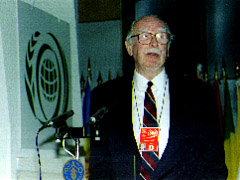


COUNCIL OF EUROPE (CE) - CONSEIL DE L'EUROPE - CONSEJO DE EUROPA | ||
Lord Mackie of Benshie, Chairman of the Sub-Committee on World Food Problems, Committee on Agriculture and Rural Development, Council of Europe (CE) | ||

I have a feeling that hunger is not only in the underdeveloped world but also in this chamber and I will try to put the points over that I wish to make quite quickly. I am representing here the Council of Europe and their Committee on Agriculture and Rural Development. Funnily enough, I am a farmer and have been a farmer for about half a century. I have enjoyed being a farmer and I am aware of their problems. I am very pleased to be talking to a United Nations body because as a young man I knew well Lord Boyd Orr, who was the first Director-General of this distinguished body and who talked a great deal of sense and it sounds as if, if his advice had been followed, it might have been in a better situation today. I come from Scotland, a country which produces many famous people, Rangers football team and a product called whisky which is much in demand and alleviates the troubles of the world all over. But really I want to make one or two farming points which we have been discussing in our Committee and one is, of course, that it is absolutely true, that without intensive farming, without the products of the Green Revolution, we would not be able to feed the world. There is no question about that. There is also no question that the public are deeply disturbed by some of our practices. They worry about chemicals being used for sprays, they even worry about fertilizers and I think that the United Nations and all governments have got to see that there is an impartial examination of these matters so that the public can be reassured. The recent panic about BSE on the Continent over beef has been an example of this. So I think that public confidence is essential. Organic farming is a lovely idea and it is one that can be pursued but it takes a great deal of land. In the old days in my native land, we improved the soil enormously by laying it down to grass for three years and sowing wild white clover, which of course raised the fertility. But it did mean that half the farm was out of production of food because it was a system which needed a long time to build fertility. So that, I think, a great deal of development has got to be done in organic farming, it has very much got a niche, a lot of people want to eat their food and I think it should be encouraged, but it is not the vital factor in feeding the world today. Sustainability is the factor. In modern farming, in the intensive districts of East Anglia and the East Coast of Scotland, we have been able to crop intensively and keep up the actual humus content of the soil, keep up the worm population and in general keep up the whole fertility of the soil. But we do it by modern forms of rotation, and it is essential that these are employed and it is essential that they are known. When it comes to the developing world, I heard the New Zealand Minister of Agriculture give an impassioned and competent speech on how well they had done in New Zealand. Of course, it is true they are immensely competent people and have a wonderful country for the sort of farming they do and they are able to compete and to beat anybody in the world. But the great thing about world free trade is a nonsense when it comes to sustaining populations in parts of Africa and elsewhere in the world who are dependant on agriculture. If you pour cheap food into the country then of course you ruin them and you drive their descendants into the towns, not to a good life but to a very bad life. Protection for agriculture in developing countries is not, in my view, a bad thing although it is against the prevailing philosophy of many thinkers in the world today. I am not going to keep this admirable body from their lunch any longer because there are two excellent speakers to follow. I merely say, to finish, that mankind is so clever he can destroy the environment and he can destroy himself. But if he uses the wit that God gave him to reason, then he can save it and this body can play a big part in so doing. | ||

 |